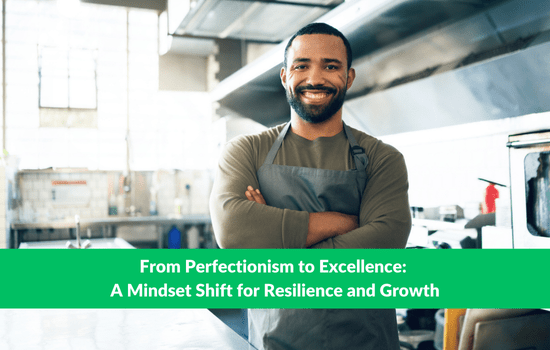Did you know that striving for excellence is very different from chasing perfection? While perfectionism traps us in unrealistic expectations, excellence focuses on personal growth, resilience, and meaningful progress.
Mastering the Art of Excellence: Letting Go of Perfection
 By making a mindset shift, you can maintain high standards with clarity, confidence, and strong emotional intelligence, without falling into the exhausting cycle of perfectionism.
By making a mindset shift, you can maintain high standards with clarity, confidence, and strong emotional intelligence, without falling into the exhausting cycle of perfectionism.Shifting from Perfectionism to Excellence
"Perfectionism is the belief that if we live perfect, look perfect, and act perfect, we can minimize or avoid the pain of blame, judgment, and shame." – Brené Brown
For many, striving for perfection, being flawless and continually measuring performance, feels like the ultimate goal. Yet, perfection is often driven by fear of failure and a desire for external validation. Instead of celebrating achievements, perfectionists dwell on mistakes, which stifles self-awareness and progress.
Example:
A client once shared that she spent hours reworking presentations to make them “perfect,” only to miss deadlines and feel constantly anxious. By shifting her focus to excellence, preparing thoroughly, embracing imperfection, and seeking feedback, she not only reduced stress but also delivered stronger work and built better relationships with her team.
The Downside of Striving for Perfection
Perfectionism can hold us back in subtle but significant ways:
-
Obsessing over tiny mistakes
-
Missing opportunities to grow and learn
-
Seeking approval rather than pursuing authentic goals
Brené Brown reminds us that perfectionism can be a defence mechanism, a way to guard against rejection and failure. Unfortunately, this keeps the focus on what others think rather than on personal growth.
What Research Tells Us About Perfectionism vs. Excellence
Studies confirm that perfectionism comes at a high cost to well-being. A meta-analysis of over 120 studies found that perfectionistic concerns are strongly linked to anxiety, depression, and obsessive-compulsive symptoms (Smith et al., 2023).
Perfectionists are also at greater risk of burnout, fueled by relentless self-criticism, overwork, and difficulty accepting rest as part of productivity (Porter, 2023). Symptoms include fatigue, emotional distance, headaches, poor sleep, and stress-related illnesses.
The good news? Research highlights practical strategies to combat perfectionism:
-
Self-compassion and psychological flexibility buffer against harmful effects (Lloyd et al., 2021).
-
Emotional intelligence (EI) strengthens resilience, reduces stress, and enhances life satisfaction (Rahman et al., 2025).
-
Growth mindset principles encourage learning and improvement over flawless performance (Dweck, 2006).
-
Positive emotions expand adaptability and personal growth (Fredrickson, 2004).
Excellence thrives on resilience, adaptability, and self-awareness, not perfection.
Changing Your Focus and Behaviour
Shifting from perfectionism to excellence is a process. Start with small, intentional steps and self-reflection:
Helpful Ways to Reduce the Emphasis on Being a Perfectionist:
-
Stop being your biggest critic
-
Stop setting unrealistic standards
-
Stop worrying about what others think
-
Stop procrastinating
-
Stop fearing failure
-
Allow yourself to fail and learn from it
-
Love and accept your imperfect self
-
Focus on progress and meaningful outcomes
Excellence does not Mean Perfection
"Excellence is an art won by training and habituation." – Aristotle
Excellence is rooted in self-awareness, emotional intelligence, and deliberate practice. Unlike perfection, it allows room for mistakes and growth. It empowers you to pause, prioritize, and keep moving forward, even when the road isn’t smooth.
Each step builds habits that strengthen your character and fuel personal growth. Excellence isn’t about being perfect, it’s about becoming your best, one step at a time.
Building Emotional Intelligence as Your Foundation
If you’re motivated to move beyond perfectionism, strengthening emotional intelligence is a key strategy. At Marshall Connects, we provide Emotional Intelligence Assessments, Coaching, and practical tools designed to support your personal and professional growth.
Perfectionism holds us back, but excellence propels us forward. By embracing self-awareness, resilience, and emotional intelligence, you can let go of the impossible pursuit of flawlessness and focus on meaningful progress. Ask yourself today: What step toward excellence can you take, no matter how small?
This article was originally published on October 5, 2019, and has been updated in September 2025.
More Motivational Reads Here »
How Emotionally Intelligent Are You?
Sign up for monthly tips to build your Emotional Intelligence and reduce Emotional Hijacking!
References
-
Dweck, C. S. (2006). Mindset: The new psychology of success. Random House.
-
Fredrickson, B. L. (2004). The broaden–and–build theory of positive emotions. Philosophical Transactions of the Royal Society B: Biological Sciences, 359(1449), 1367–1377.
-
Lloyd, S., Schmidt, U., & Tchanturia, K. (2021). Interventions to reduce perfectionism: A systematic review and meta-analysis. Behavioural and Cognitive Psychotherapy, 49(2), 188–207.
-
Porter, B. (2023, January 24). How perfectionism fuels burnout. Time Magazine. Link: www.time.com
-
Rahman, N. A., Abdullah, H., & Aziz, F. (2025). The mediating role of resilience in the relationship between emotional intelligence and perceived stress. Frontiers in Psychology, 16, 1523524.
-
Smith, M. M., Sherry, S. B., & Saklofske, D. H. (2023). Perfectionism and psychopathology in youth: A meta-analysis. Journal of Affective Disorders, 326, 271–284.

















